
JOURNAL OF COLD REGIONS ENGINEERING
Scope & Guideline
Pioneering Research in Cold Climate Challenges
Introduction
Aims and Scopes
- Geotechnical Engineering in Cold Regions:
Research on soil behavior, including the effects of freeze-thaw cycles on soil mechanics, and the interaction of materials with frozen ground. - Structural Engineering and Materials Performance:
Studies focused on the performance and durability of construction materials, such as concrete and asphalt, under low temperatures and freeze-thaw conditions. - Hydrology and Environmental Engineering:
Investigations into water movement, thermal dynamics, and environmental impacts in cold climates, particularly related to permafrost and snow. - Transportation Engineering and Infrastructure:
Research addressing the challenges of maintaining and designing transportation infrastructure in cold regions, including roadways and railways. - Climate Change Impacts and Adaptation:
Studies examining how climate change affects cold regions, particularly regarding infrastructure stability, material performance, and environmental conditions.
Trending and Emerging
- Advanced Material Research:
A significant increase in studies focusing on innovative materials, including nanoconcretes and environmentally friendly alternatives, aimed at enhancing performance in cold conditions. - Climate Change Adaptation Strategies:
Emerging research on how to adapt infrastructure and engineering practices to mitigate the impacts of climate change on cold regions, indicating a proactive approach to future challenges. - Integrated Modeling Approaches:
Growing interest in the use of advanced modeling techniques, including numerical simulations and machine learning, to predict behaviors of materials and structures in cold environments. - Sustainability and Energy Efficiency:
Increasing focus on sustainable practices, such as off-grid solar solutions and energy-efficient materials, reflecting a shift towards environmentally conscious engineering. - Infrastructure Resilience:
A trend towards evaluating and enhancing the resilience of infrastructure in response to extreme weather events and changing climatic conditions, ensuring safety and longevity.
Declining or Waning
- Traditional Frost Heave Studies:
Research specifically focused on frost heave mechanisms appears to be less frequent, possibly due to a shift towards more integrated approaches that consider multiple factors affecting soil and infrastructure. - Basic Theoretical Studies:
There seems to be a waning focus on purely theoretical analyses without practical applications, as the journal leans towards studies that offer tangible solutions to engineering problems in cold regions. - Single-Disciplinary Research:
There is a noticeable decrease in papers that focus solely on one discipline, with a growing trend towards interdisciplinary studies that combine geotechnical, environmental, and structural engineering.
Similar Journals

KSCE Journal of Civil Engineering
Building Knowledge for a Sustainable FutureKSCE Journal of Civil Engineering is a prestigious international publication dedicated to advancing the field of civil engineering. Established by the Korean Society of Civil Engineers (KSCE), this journal serves as a vital platform for high-quality research in the discipline, showcasing innovative methodologies, case studies, and critical analyses pertinent to civil and structural engineering. With an impact factor placing it in the Q2 category of civil engineering journals for 2023 and a solid Scopus rank of #141 out of 379, it reflects the significant contributions of its authors and the growing recognition of its published works. KSCE Journal of Civil Engineering, based in Germany and easily accessible to the global research community, is committed to disseminating knowledge with rigor and integrity, encouraging both emerging scholars and seasoned experts to contribute to the evolving discourse in civil engineering. With a convergence period from 2009 to 2024, the journal continues to uphold its mission of fostering innovation and excellence in engineering practice.

CANADIAN JOURNAL OF CIVIL ENGINEERING
Innovative Insights for Sustainable InfrastructureCanadian Journal of Civil Engineering, published by Canadian Science Publishing, serves as a premier platform for the dissemination of innovative research and development in the fields of civil and structural engineering, as well as environmental science. Established in 1971, this journal maintains a robust reputation, achieving a Q3 ranking in both civil engineering and general environmental science categories as of 2023. While it does not currently offer open access, the journal is accessible to a wide audience of researchers, professionals, and students who are keen to stay abreast of the latest advancements in civil engineering practices. With a significant number of yearly publications and a committed editorial board, the Canadian Journal of Civil Engineering contributes to the foundational knowledge and practical applications in the engineering community, thereby playing a critical role in addressing contemporary challenges in civil infrastructure and environmental sustainability.
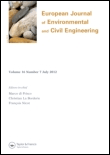
European Journal of Environmental and Civil Engineering
Advancing Sustainable Solutions for a Resilient FutureThe European Journal of Environmental and Civil Engineering, published by Taylor & Francis Ltd, is a prestigious peer-reviewed journal that serves as a vital platform for advancing knowledge in the fields of Civil and Structural Engineering as well as Environmental Engineering. With an impressive impact factor and categorized in the Q2 quartile for both engineering fields, this journal occupies a significant position in the scholarly community. Its focused scope encompasses innovative research, case studies, and practical applications that address contemporary environmental and infrastructural challenges. Researchers, professionals, and students alike benefit from the journal's commitment to high-quality discourse, as evidenced by its Scopus rankings, which place it in the top 30% in Civil and Structural Engineering and the top 40% in Environmental Engineering. Through the publication of cutting-edge studies and a commitment to fostering interdisciplinary dialogue, the European Journal of Environmental and Civil Engineering remains an essential resource for those dedicated to improving our built environment and safeguarding our natural resources.

Sciences in Cold and Arid Regions
Exploring the frontiers of environmental science.Sciences in Cold and Arid Regions, published by SCIENCE PRESS, is a pivotal open-access journal dedicated to advancing the understanding of environmental science and engineering in cold and arid environments. With an ISSN of 1674-3822, this journal provides a platform for researchers to share innovative studies and breakthroughs that address the unique challenges faced in these regions, encompassing vital areas such as earth-surface processes and environmental engineering. Although its coverage in Scopus has been discontinued since 2022, it continues to maintain importance within its specialized field, as evidenced by its rankings among other environmental science and earth sciences journals. By embracing open access, Sciences in Cold and Arid Regions ensures that cutting-edge research is freely available to a global audience, fostering collaboration and knowledge exchange among professionals and students alike, and emphasizing the critical need for adaptable strategies in managing cold and arid ecosystems.
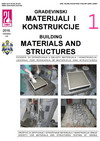
Gradevnski Materijiali I Konstrukcije-Building Materials and Structures
Pioneering sustainable practices in building materials and structures.Gradevnski Materijiali I Konstrukcije - Building Materials and Structures is a premier open-access journal dedicated to advancing the field of construction materials and structural engineering. Published by SOC MATERIALS & STRUCTURES TESTING SERBIA, this journal provides a platform for researchers, professionals, and students to share their innovative findings and developments in building materials. With a commitment to open-access since 2012, it fosters unrestricted availability of research for a wider audience, encouraging collaboration and knowledge dissemination. The journal features a diverse range of topics, including material testing, structural integrity, and sustainable construction practices, making it a vital resource for those engaged in the design and analysis of structural components. By fostering the advancement of research and practice in this crucial sector, Gradevnski Materijiali I Konstrukcije plays an essential role in shaping the future of construction and material science.
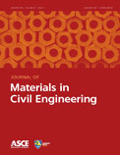
JOURNAL OF MATERIALS IN CIVIL ENGINEERING
Empowering Engineers with Cutting-Edge Material InsightsJOURNAL OF MATERIALS IN CIVIL ENGINEERING is a highly regarded publication within the field of civil engineering, published by the ASCE-American Society of Civil Engineers. This journal, which has been actively contributing to the discourse in building and construction materials since 1989, has established itself as a vital resource for researchers and practitioners alike, evidenced by its impressive Q1 rankings across multiple categories, including Building and Construction, Civil and Structural Engineering, Materials Science, and Mechanics of Materials as of 2023. With a strong focus on innovation and application in materials technology, it provides insights that are paramount for advancing practices in civil engineering. The journal's commitment to disseminating high-quality research is reflected in its exceptional standing within Scopus, where it ranks in the top quartile of its respective fields. Although not an open-access journal, it remains an essential platform for disseminating impactful research findings and fostering professional development in the materials science community. For more information or to explore the latest publications, researchers can access the journal through the ASCE library.
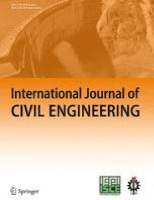
International Journal of Civil Engineering
Connecting Theory to Practice in Civil Engineering ResearchThe International Journal of Civil Engineering, published by Springer International Publishing AG, is a premier platform dedicated to advancing the field of civil engineering. With a notable impact factor and a strong reputation reflected in its Q2 quartile rankings in both Civil and Structural Engineering as well as Geotechnical Engineering and Engineering Geology, this journal facilitates the dissemination of high-quality research from 2009 through 2024. Researchers and professionals can access cutting-edge studies and innovative practices that address contemporary challenges in civil engineering, such as sustainable infrastructure development, environmental impacts, and advanced material technologies. Situated in Switzerland, the International Journal of Civil Engineering emphasizes the critical interplay between theory and application, making it an essential resource for students, academics, and industry leaders seeking to stay at the forefront of their disciplines.
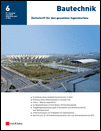
Bautechnik
Advancing construction knowledge for a sustainable future.Bautechnik is a premier academic journal in the fields of Building and Construction and Civil and Structural Engineering, published by ERNST & SOHN in Germany. With a history dating back to 1969 and a significant converged timeline through various years, this journal offers a rich repository of peer-reviewed research dedicated to advancing the principles, methodologies, and innovations within its domains. Bautechnik is currently ranked in the Q3 category for both building and construction, as well as civil and structural engineering, indicating its relevance and contribution to the academic community. Though it does not offer open access, its curated content is accessible to a global audience of researchers, professionals, and students striving for excellence in their fields. The journal aims to foster discussions and disseminate knowledge that impacts the future of construction, architecture, and engineering practices.
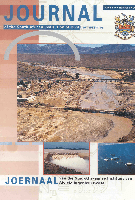
Journal of the South African Institution of Civil Engineering
Fostering collaboration for a resilient built environment.Journal of the South African Institution of Civil Engineering (ISSN: 1021-2019) is a distinguished open-access publication dedicated to advancing the field of civil engineering in South Africa and beyond. Established by the South African Institution of Civil Engineering (SAICE) and South African Institute of Steel Construction (SAISI), it serves as a critical platform for sharing research, case studies, and industry developments. The journal has been openly accessible since 2015, ensuring broader dissemination of knowledge among researchers, professionals, and students alike. Although it currently holds a Q4 ranking in Civil and Structural Engineering and is positioned within the lower percentiles in Scopus rankings, its commitment to fostering growth in the engineering sector remains strong. Covering various topics from structural design to innovative construction methodologies, the journal invites contributions that push the boundaries of current practices and methodologies. This publication is essential for those invested in sustainable engineering solutions, aiming to collaborate and contribute towards the evolution of civil engineering standards in South Africa.
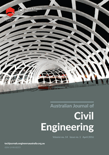
Australian Journal of Civil Engineering
Advancing the Future of Civil EngineeringThe Australian Journal of Civil Engineering, published by Taylor & Francis Ltd, stands as a pivotal platform within the field of civil and structural engineering. With an ISSN of 1448-8353 and an E-ISSN of 2204-2245, this journal consistently delivers high-quality research and innovative practices from both established and emerging scholars in the discipline. Recognized in the Q2 category for Civil and Structural Engineering in 2023, it holds a respectable position, ranking 146 out of 379 within its field according to Scopus, which places it in the 61st percentile. Converging valuable insights from 2011 through 2024, the journal encompasses a broad scope of topics, including sustainable infrastructure, innovative materials, and advanced construction techniques, thereby addressing contemporary challenges faced by engineering professionals. Though it is a traditional publication without open access options, the quality of the research featured ensures that it remains an essential resource for academics, practitioners, and students striving to enhance their knowledge and contribute to the dynamic field of civil engineering.